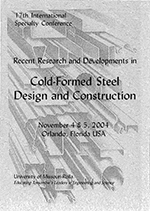Session Dates
04 Nov 2004 - 05 Nov 2004
Abstract
Cold-formed steel roof truss systems that use complex hat shape members for both top and bottom chord elements are a growing trend in the North America steel framing industry. When designing cold-formed steel sections, a structural engineer typically tries to improve the local buckling behavior of the coldformed steel elements. The complex hat shape has proven to limit the negative influence of local buckling. However, a distortional buckling mode can be the control mode of failure in the design for the chord member with an intermediate un-braced length. The chord member may be subjected to both bending and compressive load because of the continuity of the top and bottom chord members. These members are not typically braced between each panel point in a truss. Numerical analyses using finite strip and finite element procedures were developed to compare with experimental results. A parametric study on geometric imperfection was also conducted to investigate the factors that affect the ultimate strength behavior of a particular complex hat shape. Better understanding of the flexural behavior of these complex hat shapes is necessary to obtain efficient, safe designs of a truss system. The results of these analyses will be presented in the paper.
Department(s)
Civil, Architectural and Environmental Engineering
Research Center/Lab(s)
Wei-Wen Yu Center for Cold-Formed Steel Structures
Meeting Name
17th International Specialty Conference on Cold-Formed Steel Structures
Publisher
University of Missouri--Rolla
Document Version
Final Version
Rights
© 2004 University of Missouri--Rolla, All rights reserved.
Document Type
Article - Conference proceedings
File Type
text
Language
English
Recommended Citation
Nuttayasakul, Nuthaporn and Easterling, W. Samuel, "Behavior of Complex Hat Shapes Used As Truss Chord Members" (2004). CCFSS Proceedings of International Specialty Conference on Cold-Formed Steel Structures (1971 - 2018). 7.
https://scholarsmine.mst.edu/isccss/17iccfss/17iccfss-session2/7
Behavior of Complex Hat Shapes Used As Truss Chord Members
Cold-formed steel roof truss systems that use complex hat shape members for both top and bottom chord elements are a growing trend in the North America steel framing industry. When designing cold-formed steel sections, a structural engineer typically tries to improve the local buckling behavior of the coldformed steel elements. The complex hat shape has proven to limit the negative influence of local buckling. However, a distortional buckling mode can be the control mode of failure in the design for the chord member with an intermediate un-braced length. The chord member may be subjected to both bending and compressive load because of the continuity of the top and bottom chord members. These members are not typically braced between each panel point in a truss. Numerical analyses using finite strip and finite element procedures were developed to compare with experimental results. A parametric study on geometric imperfection was also conducted to investigate the factors that affect the ultimate strength behavior of a particular complex hat shape. Better understanding of the flexural behavior of these complex hat shapes is necessary to obtain efficient, safe designs of a truss system. The results of these analyses will be presented in the paper.



